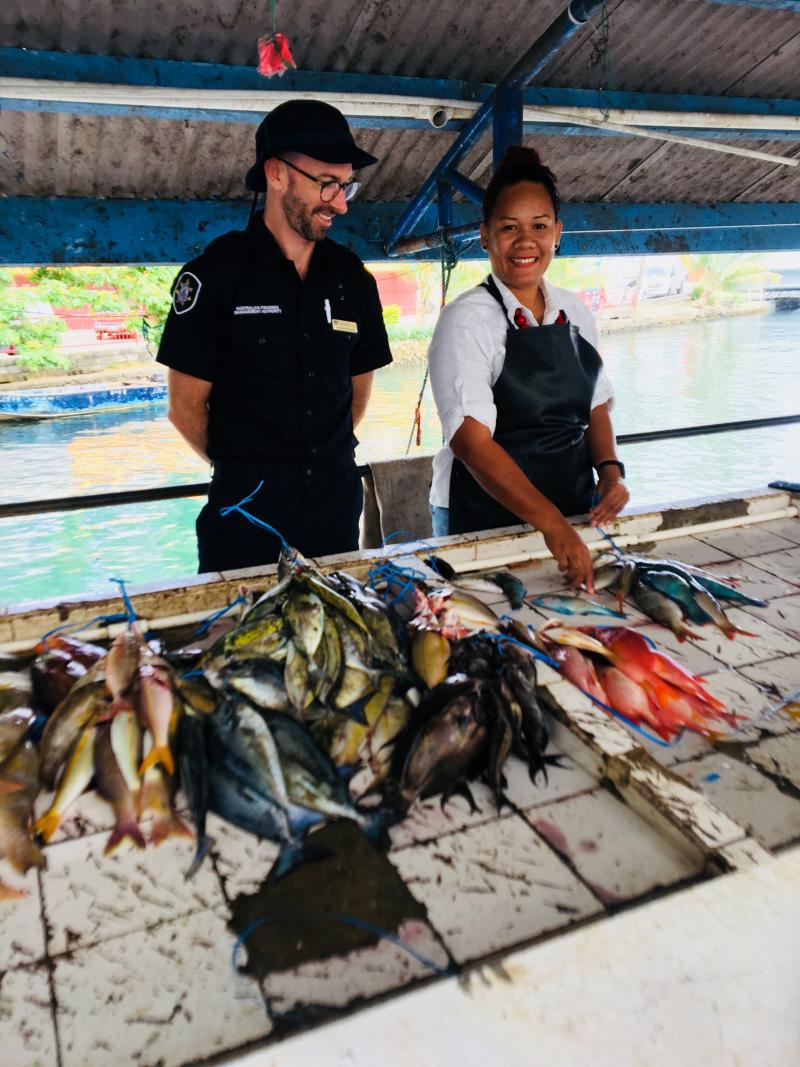
SUVA, Fiji - Twenty-seven fisheries enforcement officials will in nine days’ time be able to understand practical ways to conduct fish market inspections, interpret fisheries legislation and take part in a moot court exercise on evidence gathering and presenting witnesses to curb illegal fishing practices in the Pacific Ocean.
The officers from nine Pacific Island countries, of which 13 are women, will be part of this face-to-face competency-based assessment (CBA), a culmination of online delivered cohorts for the past six months.
Since 2018, the Pacific Community (SPC), in partnership with the University of the South Pacific (USP) have collaborated to deliver the Certificate IV in Coastal Fisheries and Aquaculture Compliance course which is currently underway at the Workforce Development Training Unit of the USP Pacific Technical and Further Education (Pacific TAFE) in Fiji, through the Pacific-European Union Marine Partnership Programme (PEUMP).
Funded by the European Union and the Government of Sweden, the EUR 45 million PEUMP programme promotes sustainable management and sound ocean governance for food security and economic growth, while addressing climate change resilience and conservation of marine biodiversity. It follows a comprehensive approach, integrating issues related oceanic fisheries, coastal fisheries, community development, marine conservation and capacity building under one single regional action.
“With the first cohort of 16 students successfully completing their competency assessments last year it is the beginning of improved access to fisheries and marine education and training that is focused on the identified needs of communities and nation states,” said Dr Francis Mani. Associate Dean Learning, Planning and Quality Faculty of Science, Technology and Environment.
Thousands of islands and communities scattered across nearly 40 million km2 of the Pacific ocean rely on small-scale fisheries which provides 50 to 90% of dietary protein and represents the primary or secondary source of income for 50% of households in the Pacific Islands Countries and Territories.
“The skills we instill into fisheries officers are those of a professional compliance officer, one who is respected for being fair but firm when detecting an offence” says Ian Freeman, Coastal fisheries and aquaculture monitoring and surveillance specialist from SPC.
During the two weeks training, fisheries officers are taught the skills for dealing with people, managing many different compliance situations, the processes to gather evidence and put together a compliance file that may lead to a specific enforcement action - ranging from a verbal or written warning to a full prosecution. Course includes time-bound online components and eight days of face-to-face training and competency assessments.
The Head of Cooperation at the Delegation of the European Union for the Pacific, Christoph Wagner said, “The effective management of coastal fisheries and aquaculture at the national and community level is fundamental to ensure food security, economic and social development. This requires stronger skills and capacities for fisheries professionals. Through the Pacific-EU Marine Partnership several regional organizations have been partnering up to develop new and targeted courses for key stakeholder groups in fisheries and marine resources management. The EU is proud to support this partnership and the development aspiration of sustainable fisheries and improved governance”.
The New Zealand Ministry of Foreign Affairs and Trade (MFAT) originally provided the Certificate IV funding under the project “Improving fisheries food security and sustainable livelihoods for Pacific island communities”.
The New Zealand Ministry of Primary Industry’s Te Patui (Pacific Fisheries) advisers also provided support to this initiative. “The New Zealand Government understands the importance of compliance measures for fisheries management in the Pacific region and we were pleased to be able to contribute to this comprehensive course that complies with the required standards of competency,” said Alex Jebson from the New Zealand High Commission.
The assessment participants are from Cook Islands, Kiribati, Nauru, Samoa, Solomon Islands, Tonga, Vanuatu, Tuvalu and Fiji.
Media Contacts:
Josephine Prasad, USP PEUMP Programme Communications Consultant +679 9922098
Toky Rasoloarimanana, Communications Officer, Fisheries Division, Pacific Community l [email protected], Mob : +687 89 93 94
Mohammed Nazeem KASIM, EU Press Officer, +679 3313-633 [email protected]